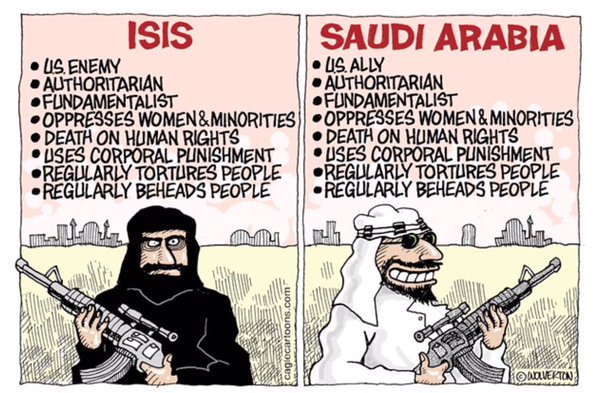Searching for the truth – Distrust everything, including this blog
I’m suspicious of all politicians. Success in politics requires compromise – and it’s difficult, if not impossible, to maintain moral integrity and stick to your principles in the face of bribes, threats, the power of vested interests, and the fickleness of public opinion.
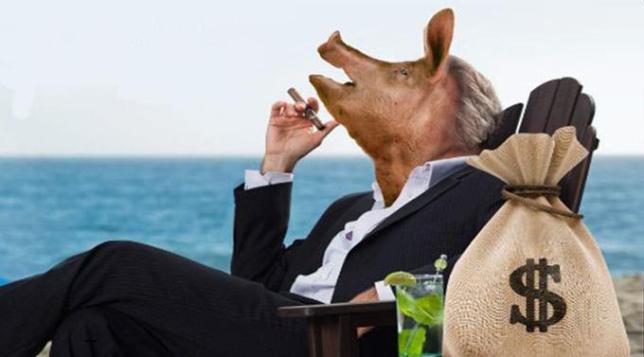 I have personal first-hand experience in New Zealand of what the political and business establishment will do to get rid of threatening opposition. I know that those interests control the mainstream media and largely determine what news and views will be presented, and what suppressed.
I have personal first-hand experience in New Zealand of what the political and business establishment will do to get rid of threatening opposition. I know that those interests control the mainstream media and largely determine what news and views will be presented, and what suppressed.
So why do I continue to read and watch those obviously manipulated media? For me, an important principle is, Know your enemy. If you don’t know what they are saying and doing, how can you hope to counter them?
Furthermore, although they are controlled, those media often contradict each other, or provide information unwittingly that undermines the establishment position. Ignoring them as a source limits one’s ability to fight against them.
And what is the alternative? I love the Internet, and I am in awe of the volume of information available; its anarchic uncontrollable character; and the fact that I can find answers to my every question. The Internet has transferred some of the power out of the hands of governments and those who control them, and given it to those of us who are searching for the truth.
 Nevertheless, we would be naïve to believe that those governments and corporate interests are not aware of the danger, and don’t seek to use social media for their own purposes.
Nevertheless, we would be naïve to believe that those governments and corporate interests are not aware of the danger, and don’t seek to use social media for their own purposes.
Consequently, I am disappointed when I find companions in the quest for truth seeming to accept unquestioningly arguments and material disseminated on the blogosphere.
A case in point:An article recommended to me, entitled “Should US-Saudi Alliance Be Saved?” written by one Patrick J Buchanan. Read the piece if you want – maybe you already have. Anyway, some comments of my own:
_________________________________
I must say the more I read about WWII and events leading up to it, the more I’m inclined to agree that it was an unnecessary war. Well, all wars are bankers’ wars, as they say. Oliver Stone made the case that dropping A-bombs on Japan was totally unnecessary. The more I see of Germany, the more I think the Allies smashed the country so they could lend them the money to rebuild afterwards – and probably the same was true for Japan.
I’m not so keen on Buchanan’s analysis in this instance though. He makes one or two valid points, but his argument is a bit muddied, I think, and his conclusion definitely questionable:
For sure, in the Kashoggi case, the US has a major conflict of interest – and economic realities will undoubtedly figure in any decision they take about what to do in the matter.
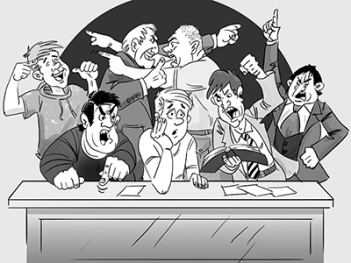
Oh, what is the truth, man? Let’s hear from the women?
I don’t understand, though, why Buchanan has to go back to Ottoman times tor his first parallel; part of the widespread anti-Turkey mindset? At least he didn’t go for the old chestnut of the Armenians (as an aside, I wonder why not?). Of course we know the Brits were just as self-interestedly hypocritical as Uncle Sam. There was plenty of international outrage in the 1860s and 70s re what the Russians were doing in the Caucasus, but not much came of that.
Diplomatic realities, of course, are diplomatic realities. What did the US have to gain by refusing to “recognize” the Soviet Union, or PRC China, for that matter? They exist, and you can’t really ignore that. Recognizing them didn’t stop all the anti-Communist propaganda of the Cold War, though. Nor did it stop the US from continuing to support the “Nationalist” regime in Taiwan.
I’m no fan of Winston Churchill, but, when dear old England was fighting for its life in WWII, I can imagine he might have considered running an investigation into Nazi Germany’s discovery of suspicious graves in Poland to be a debatable luxury. You can’t really blame the guy if he had other more pressing matters on his mind.
Buchanan does have a valid point about Chile, South Korea, the Philippines and Iran (and he could have added many more to the list). As we know, these were all more or less US puppet leaders. All that proves is that any administration in the US is totally devoid of morality, not just Trump’s. Absolutely the US was behind the overthrow of Mohammed Morsi in Egypt, just as they had supported Hosni Mubarak’s dictatorship for nearly 30 years.
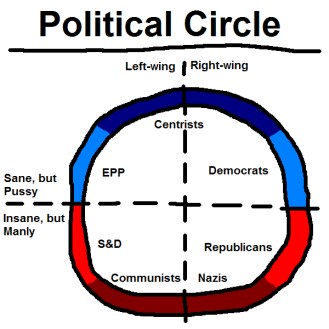
So where do I sit?
Another thing I don’t understand is the criticism of Turkey I constantly hear: “There was a failed military coup attempt in 2016 and the government has used this an excuse to arrest thousands of people.”
Turkey had experienced four successful military takeovers between 1960 and 1997. It must be obvious that senior army officers would not risk their careers, never mind their lives, if they didn’t believe they had significant support, at least within the country, if not from outside its borders. Surely we would expect a far-reaching governmental investigation to follow a coup failure, and some pretty serious consequences for anyone found to have been involved.
As for the imprisoned journalists – I keep hearing this, and most of the figures seem to emanate from a shady outfit calling itself Reporters without Borders. The fact is, I live in Turkey, and I am surrounded by people who are shrill and ceaseless in their hatred and criticism of President Erdoğan, yet I don’t know anyone who has been arrested or imprisoned. The leader of the largest opposition party CHP is constantly criticising the government, and his speeches are always reported at length in mainstream media. International news media are never-ending in their attacks and black propaganda they circulate about Turkey’s government, and I have no trouble accessing their websites. Who are these imprisoned journalists, and what did they do to get themselves in trouble? Criticism is one thing, but supporting violence and armed rebellion against your country’s elected government is surely a different matter – especially in a region as volatile as the one where Turkey is located.
As another aside, most of what I see in NZ and UK media these days seems to focus on royal marriages and babies! CNN’s only interest in the Kashoggi matter seems to be how it will affect the stock market. Al Jazeera is covering it very thoroughly and we know the US and the Saudis would dearly love to shut them down. What happened to Bradley/Chelsea Manning in the USA? Where are Edward Snowden and Julian Assange? And what happened to all the outrage over Wikileaks’s leaks after it became clear that the US government was going to pursue anyone disseminating the information? Who owns most of the private news media in Italy? I have to say I find the hysteria over journalists in Turkey to be totally hypocritical!
Finally, Buchanan’s conclusion: “Rather than resist Congress’ proposed sanctions, President Trump might take this opportunity to begin a long withdrawal from decades of entanglement in Mideast wars that have availed us nothing and cost us greatly.”
Is he serious? Cost the US greatly, for sure – but is he overlooking the oil? Why does he think the US is involved in the Middle East at all? Why did they create Israel in the first place, and why do they continue to support them, right or wrong? Why do they hate Iran so much? Why do they support brutal dictators in Egypt and Saudi Arabia etc? If not for Saudi oil it would have been much harder to apply pressure to socialist governments in countries like Venezuela. Why are they so keen to support Kurdish separatists in Iraq and Syria if not to establish a grateful oil-rich puppet state?
I expect more reasoned argument from those who set themselves up as alternatives to the mainstream press.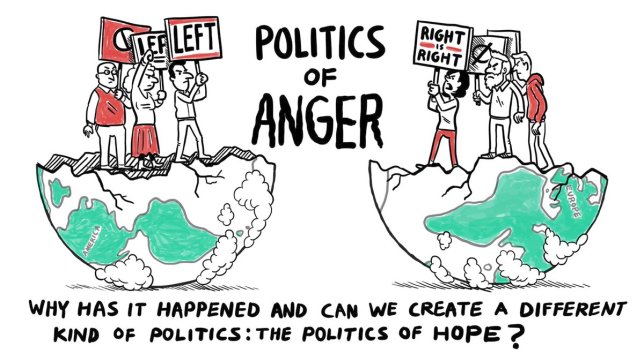
Search for justice in the Kashoggi case? How sincere are leaders in the West?
We Must Use the Global Magnitsky Act to Punish the Killers of Jamal Khashoggi
As details emerge of what happened to Jamal Khashoggi, one can’t help but be truly terrified.
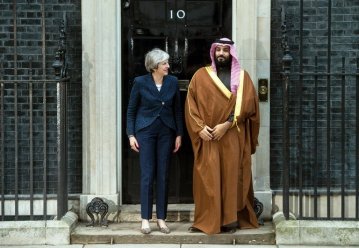
What have you got to say, Trees? Apparently they’re just good friends
Khashoggi, a Saudi citizen who was an outspoken critic of his government, went to his country’s consulate in Istanbul on Oct.2 to pick up a document showing he was divorced so he could marry his fiancée. He did not emerge, and has not been seen since. Little has been independently confirmed, but the Turkish government claims Saudi agents tortured, killed, and dismembered Khashoggi, and fled the country, carrying his remains.
If it is shown that Khashoggi was indeed murdered in this grotesque way, this presents a fundamental challenge to the civilized world. He was a Washington Post journalist, a respected member of the international community, and he was in a NATO-member country trying to start a new life. If what is alleged turns out to be true, and the Saudis get away with Khashoggi’s grisly murder on Turkish soil, then it will give a green light to any thin-skinned ruler to go ahead and assassinate critics without fear of consequences.
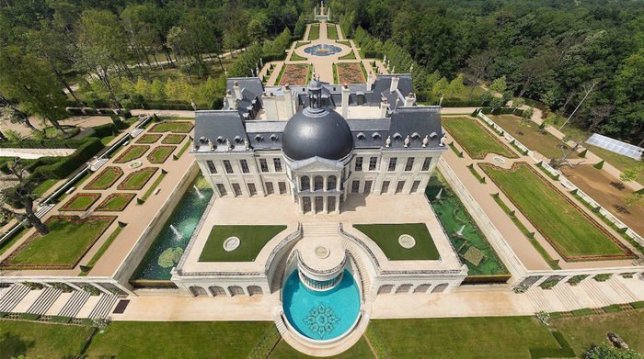
$300 million Saudi-owned chateau in France
Although our policy tools are limited, there is a way to create consequences for this kind of atrocity: the Global Magnitsky Act. This is a piece of legislation that has the power to freeze assets and ban visas of gross human rights abusers from anywhere in the world. It was named after my Russian lawyer, Sergei Magnitsky, who uncovered a massive Russian government corruption scheme in 2008.
He bravely exposed the officials involved, was subsequently arrested by some of the very people he testified against, tortured for 358 days, and killed in November 2009 in Russian police custody. Versions of the Global Magnitsky Act now exist in the United States, Canada, the United Kingdom, Estonia, Latvia and Lithuania. It is currently on the agenda in the European Union.

Saudi private jet – $500 million Airbus A380
The Global Magnitsky Act is like a modern-day cancer drug. Instead of targeting the whole body, it specifically targets the cancer cells. In this case, instead of sanctioning an entire country and punishing innocent citizens for crimes of the regime, the Global Magnitsky Act goes directly after the individuals who made the criminal decisions and carried them out. It has been successfully used against Burmese generals, Nicaraguan security operatives, and the Russian officials responsible for killing Sergei Magnitsky.
Now, almost every lawmaker on the Senate Foreign Relations committee is pushing for the Trump administration to use Global Magnitsky Sanctions on whoever is found responsible for Khashoggi’s disappearance and/or murder. If the Turkish reports are confirmed, then we in the West must act.
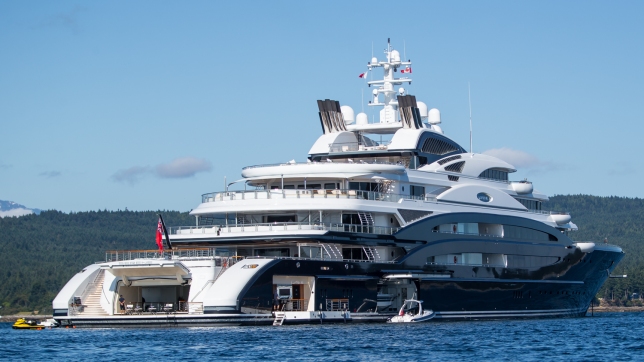
$134 million Saudi yacht
Applying the Global Magnitsky Act to Saudi officials would be particularly powerful. These officials are extremely rich, and they keep their money all over the world. They have bank accounts in every major financial capital, and they own luxury properties in London, Paris, and New York.
The moment that a person is added to a Magnitsky List in the West, it destroys their way of life. Every financial institution will close their account, and they will be denied entry to every desirable area in the world. While asset freezes and travel bans don’t constitute real justice for pre-meditated murder, they’re a lot better than total impunity.

Fleet of gold-plated Saudi cars

Saudi girlfriends on board the yacht. Don’t know how much they cost
This is a defining moment in our history. We can either allow savagery to rule the world, or use the tools we’ve created to maintain civilization and stability. The United States, Canada, the United Kingdom, and Europe must impose Global Magnitsky sanctions on the Saudi officials who carried out and sanctioned this atrocity — even if the buck stops at the very top.
Source: Time
“Kashoggi interrogated, tortured and then murdered.”
Recordings prove Jamal Khashoggi was killed, Turkish investigators claim
Sources say audio and video evidence show journalist died at Saudi consulate in Istanbul
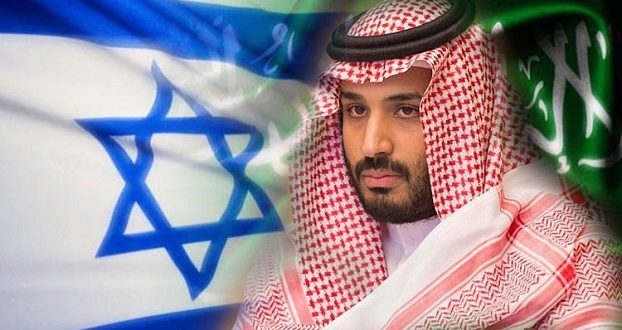
Friends of the USA – Don’t upset them!
Turkish investigators have claimed video and audio recordings exist that prove Jamal Khashoggi was killed, a sign that Ankara is willing to keep up the pressure on Riyadh to back up its claims it has nothing to do with the dissident journalist’s disappearance.
US government officials told the Washington Post late on Thursday that their Turkish counterparts claimed the recordings from 2 October proved Khashoggi was murdered and his body dismembered during a visit to the Saudi consulate in Istanbul to pick up marriage paperwork.
The alleged audio evidence – which Turkish sources have also suggested exists in comments to the Guardian – is particularly strong, according to officials.
“You can hear his voice and the voices of men speaking Arabic,” a source told the Washington Post. “You can hear how he was interrogated, tortured and then murdered.”
United States spin-doctors – Have they no shame? More on Jamal Kashoggi
I always hated that English expression “gobsmacked”, meaning “shocked beyond the point of incredulity”.
Nevertheless, I have to accept that the word can serve a purpose – and I was pretty close to smacking my gob as I read this article in Time online about the disappearance of rebel Saudi journalist Jamal Kashoggi.
Kashoggi’s disappearance is attracting some media attention since he entered the door of the Saudi Consulate in Istanbul on 2 October, and hasn’t been seen since. I’ve already posted the Turkish version of the story – but here is, I guess, the beginning of the US spin.
There is a saying in Turkish “Hem suçlu, hem güçlü”– which means something like: “Guilty as hell but toughing it out.” While reading the following, keep in mind that the unelected royal family of Saudi Arabia are close allies of the United States, and currently using weapons supplied by Washington to bomb the bejabers out of poor little Yemen. Don’t lose sight of the fact that: “Since the September 11 attacks, the United States government has carried out drone strikes in Pakistan, Yemen, Somalia, Afghanistan, and Libya.
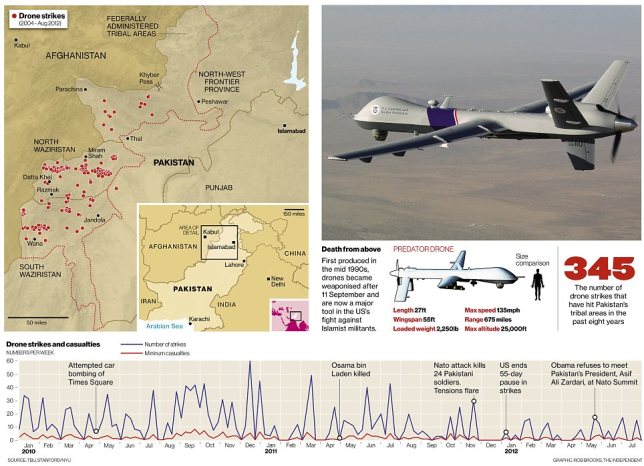
This is just Pakistan
Drone strikes are part of a targeted killing campaign against jihadist militants; however, non-combatant civilians have also been killed in drone strikes. Determining precise counts of the total number killed, as well as the number of non-combatant civilians killed, is impossible; and tracking of strikes and estimates of casualties are compiled by a number of organizations.” (Wikipedia)
“As Donald Trump assumes office today, he inherits a targeted killing program that has been the cornerstone of U.S. counterterrorism strategy over the past eight years. On January 23, 2009, just three days into his presidency, President Obama authorized his first kinetic military action: two drone strikes, three hours apart, in Waziristan, Pakistan, that killed as many as twenty civilians. Two terms and 540 strikes later, Obama leaves the White House after having vastly expanding and normalizing the use of armed drones for counterterrorism and close air support operations in non-battlefield settings—namely Yemen, Pakistan, and Somalia.” (The Council on Foreign Relations)
_______________________________________
These are extracts from the Time article:
Jamal Khashoggi’s Disappearance Comes as Autocrats Are Growing Bolder in their Brutality
As of Oct. 10, the assumption is that the Saudi regime took the opportunity to silence one of its more prominent critics.
The mystery is how. Turkish authorities, albeit not the most trusted bunch themselves, believe Khashoggi was murdered inside the building by a team of 15 operatives, his corpse dismembered and transported outside in boxes. The Saudis claim he left alive and have pledged to investigate—though few believe a Saudi regime that has long been unafraid to detain or punish dissidents.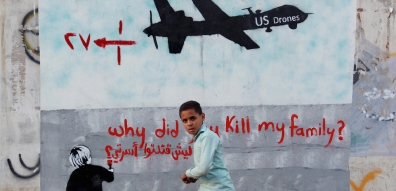
Although the murder of a critic on foreign soil would, if confirmed, be an unprecedented act even for a brutal kingdom,it fits within a larger pattern. Across the world, authoritarian countries like Saudi Arabia have developed a rising sense of impunity when it comes to human rights and the rule of international law. Behavior once hidden behind palace doors now happens beyond borders and in the full view of the world.
Take China. Aside from the legion of human-rights abuses committed inside its own borders, including the detention of 1 million Uighurs, Beijing arrested Meng Hongwei, who as head of Interpol was a symbol of the international rule of law. Both have been ensnared by an antigraft campaign that President Xi Jinping and his regime have used to target critics and rivals. Russia too has taken its crackdown on dissenters global, most recently with the brazen poisoning attempt on former double agent Sergei Skripal in the U.K.
This is happening with the implicit acceptance of the U.S., which under President Donald Trump has rejected its role as a champion of universal values like human rights.
But Trump is only one facet of this diminution of the U.S. as a moral lodestar for the world. . . A century of moral diplomacy begun by Woodrow Wilson is coming to an end under Trump.
The U.S. Congress may yet do so. And if Khashoggi’s murder can be confirmed, then economic sanctions will likely follow. But defending and spreading liberal values requires a more patient approach than crude dollar diplomacy.
Worryingly, this trend toward impunity comes as voters worldwide seem more attracted to strongmen and dictators.
_______________________________________________
 Pardon my lapse of memory – When exactly was it that “the U.S. [w]as a moral lodestar for the world”?
Pardon my lapse of memory – When exactly was it that “the U.S. [w]as a moral lodestar for the world”?
Oh, sorry, I see . . . apparently “A century of moral diplomacy [was] begun by Woodrow Wilson”, but “under President Donald Trump has rejected its role as a champion of universal values like human rights”.

Are you as gobsmacked as me?
What’s going on with Jamal Kashoggi?
Apparently, the Trump administration have offered to send FBI agents to Istanbul to “help” with the investigation. An article I’ve just read in Time says:
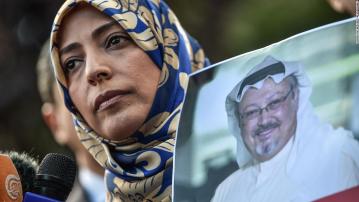
Protesting the disappearance in Istanbul
“the assumption is that the Saudi regime took the opportunity to silence one of its more prominent critics.
The mystery is how. Turkish authorities, albeit not the most trusted bunch themselves, believe Khashoggi was murdered inside the building by a team of 15 operatives, his corpse dismembered and transported outside in boxes.”
What can you say to that? The FBI couldn’t stop 9/11, even when they had strong evidence it was coming! And you can’t trust Turkish authorities?! On the other hand, of course, you can totally trust US authorities, and British, and New Zealand, and Australian . . .
Well, if you’d like to see what the Turkish investigation has turned up so far, check this out – and then decide for yourself who to trust.
______________________________________
Apple Watch ‘at heart of investigation’ on missing Saudi journalist Khashoggi
Two senior Turkish officials revealed the existence of an object that may provide important clues to the fate of Jamal Khashoggi, a Saudi journalist who disappeared in Istanbul last week: The black Apple watch he was wearing when he entered his country’s consulate.
The watch was connected to a mobile phone he left outside, Reuters quoted the Turkish officials as saying on Oct. 10.
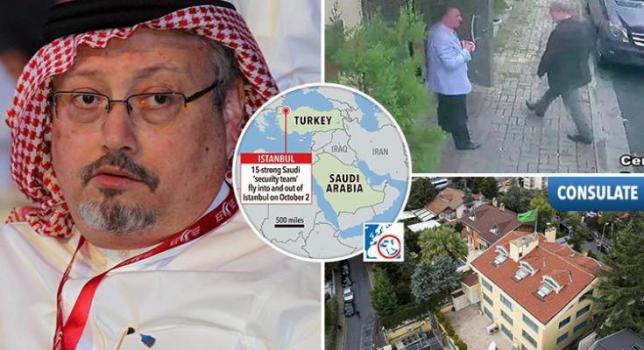
“Will you come into my parlor?” said the spider to the fly . . .
Khashoggi, a veteran Saudi journalist and newspaper editor, had lived in exile in Washington for more than a year, writing a column for the Washington Post in which he regularly criticised his country’s crackdown on dissent, its war in Yemen and sanctions imposed on Qatar.
He said he could write freely in the United States in a way that was impossible at home, according to friends and colleagues, but he was increasingly worried that Riyadh could hurt him or his family.
In Turkey, though, Khashoggi had friends in high places, including some of President Tayyip Erdoğan’s advisers. So when he walked into the Saudi consulate in Istanbul at 1 p.m. on Tuesday, Oct. 2, he hoped the appointment would be brief, a simple bureaucratic task that would allow him to marry his Turkish fiancee, whom he had met four months earlier.
“He said the safest country in the world for Saudi Arabians was Turkey,” said Yasin Aktay, an Erdoğan aide and close friend of Khashoggi.
Friends and family have not seen him since.
Turkish officials have said they believe Khashoggi, 59, was killed inside the consulate.
Every cloud has a silver lining – looking on the bright side in Yemen
Made-in-the-USA missiles bring some benefits to Yemen’s economy
Yemeni smiths beat missiles into knives for half price of Turkish steel (but maybe Turkey won’t be so happy)
Sometimes, the raw material of Ali Ghomari’s work comes screaming from the sky.
Missiles fired by Saudi-led coalition jets rain down on militiamen and civilians alike, killing and maiming thousands. Children, farmers and others collect shrapnel from their farmlands, from dirt alleys in impoverished neighborhoods, and offer it for sale to Ghomari and other artisans.
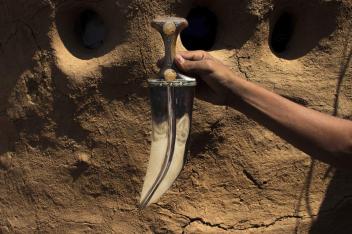
Dagger crafted from missile fragment
From missiles, they do not make ploughshares. They make knives – jambiyya, the ornamental daggers Yemeni men wear for prestige and as a show of courage.
Once, they were made of imported steel, but high prices have forced craftsmen to use the refuse of war. One kilogram of fragment steel costs about 500 rials (less than $1), half the price of Turkish steel.
Ghomari, who is in his 50s, said he learned his craft from his father, who inherited the skill from his ancestors. The entire Ghomari family of seven households works as blacksmiths in the northern city of Abs; they sit in huts constructed of cinderblocks or tree branches, forging glowing metal around open fires.
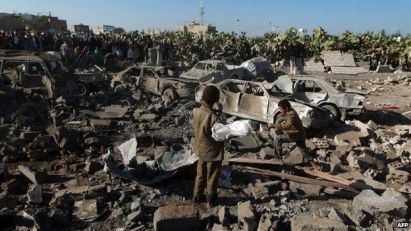
Searching for missile fragments amongst the rubble
Ghomari said knives were once a profitable business. But the father of six lamented that the market has weakened as the war-ravaged economy has tanked, and fewer men have extra money to pay for jambiyya.
When he has the money, Ghomari sometimes buys the remains of trucks and cars destroyed in wrecks, bombings or airstrikes.
“Trucks make the best dagger because the steel is strong and special,” he said.
The daggers have curved blades and are a part of traditional Yemeni attire – slipped into a decorated, hook-shaped sheath and tucked in vertically at the center of ornate belts if men are wearing robes, or placed in the top of a maawaz, a wrap-around male skirt. The blade is made of steel and the stronger the steel the more expensive the dagger. The shape of the hilt often refers to the city, region or tribe of the person carrying it, and the price also depends on whether the hilt is made of wood, buffalo horn or rhinoceros horn.
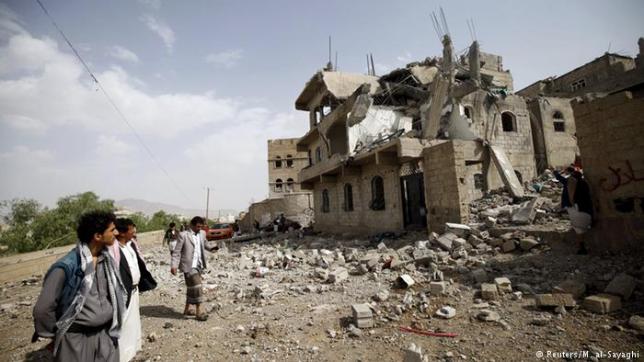
Oh good! Another missile strike! Now we can make more daggers!
The more expensive the dagger, the more elevated the status of the man who wears it. Prices for new daggers range from $100 to $150. Old ones inherited from ancestors might be worth hundreds of thousands of dollars.
The war between Yemen’s government and the Iran-backed Shiite Houthi rebels has been going on for nearly four years. The Saudi-led coalition of Sunni countries supported by the United States joined the fray in March 2015, launching a relentless air campaign with an arsenal made up mostly of U.S.-made missiles and other weaponry, providing plenty of metal for Ghomari and his family.
This is nothing new. During Yemen’s 1962-1970 civil war, Egypt and Saudi Arabia backed opposite sides. Ghomari’s father used Egyptian tank treads, artillery shells and rockets to make knives.
Today, Ghomari points to the anvil on which he beats missiles into daggers.
It is an empty mortar shell – from the 1960s.
Turkey imprisons journalists? – E U countries murder them!
Bulgarians mourn murdered journalist – raped, beaten and suffocated
Leading EU politicians and media activists urged Bulgaria on Oct. 8 to conduct a fast investigation into the murder of journalist Viktoria Marinova, as mourners planned vigils across the Balkan country.

Murdered Bulgarian journalist, Viktoria Marinova
Marinova’s body was found in a park near the Danube river in her home town of Ruse on Oct. 6. Prosecutors said she had been raped, then beaten and suffocated.
Bulgarian Interior Minister Mladen Marinov, who travelled to Ruse to oversee the inquiry on Monday, has said there was no evidence so far to suggest a link to Marinova’s work as a journalist.
But media focused on her recent work. On her last TV show on Sept. 30 Marinova featured two journalists who were investigating an alleged corruption case involving EU funds. She promised that her recently launched current affairs show ‘Detector’ would do more of its own investigations.
“Shocked by the horrendous murder of Victoria Marinova. Again a courageous journalist falls in the fight for truth and against corruption,”the European Commission’s First Vice-President Frans Timmerman tweeted.
Marinova is the third journalist murdered in the European Union over the past 12 months.
Daphne Caruana Galizia, Malta’s best-known investigative reporter, was killed when a bomb blew up her car in October last year and Slovak journalist Jan Kuciak was shot dead in February.
Vigils were planned in Sofia, Ruse and the northern cities of Vidin and Pleven.
Bulgaria ranked 111 out of 180 countries in the Reporters Without Borders world press freedom index this year, lower than any other EU member and also lower than other countries in the western Balkans, some of which are candidates for EU membership.
In October 2017 hundreds of Bulgarian journalists protested in downtown Sofia downtown against threats from Deputy Prime Minister Valeri Simeonov against the country’s biggest broadcasters. He accused the mainstream media of leading a “massive smear campaign” against him.
Who’s helping the refugees? Only Turkey?
The MV Aquarius 2 is a 1977-built research vessel. It has been chartered and operated since February 2016 by the NGOs SOS Méditerranée and Médecins Sans Frontières (MSF or Doctors without Borders) as a rescue vessel for migrants and refugees making the Mediterranean crossing in makeshift craft from Libya to Italy as part of the European migrant crisis.
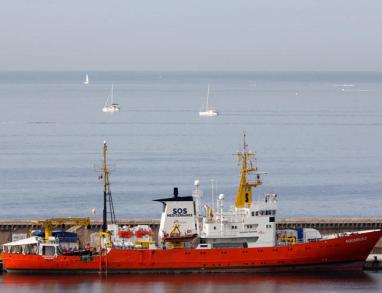 The operating groups were obliged to register the ship in Gibraltar and then Panama, one assumes because no European countries would accept it. Now it seems, in spite of accepting on to their books every kind of dodgy oil tanker and decrepit, unseaworthy rust-bucket crewed by seamen from the Third World, even those two puppet states of Western corporate interests have cancelled Aquarius’s registration.
The operating groups were obliged to register the ship in Gibraltar and then Panama, one assumes because no European countries would accept it. Now it seems, in spite of accepting on to their books every kind of dodgy oil tanker and decrepit, unseaworthy rust-bucket crewed by seamen from the Third World, even those two puppet states of Western corporate interests have cancelled Aquarius’s registration.
Turkish Red Crescent calls for protection of migrant ship Aquarius
Turkish Red Crescent President Kerem Kınık on Oct. 6 called for the protection of rescue ship Aquarius.
The Aquarius, operated by the SOS Mediterranee and Doctors Without Borders (MSF), saves migrant lives in the Mediterranean Sea. It has faced a blockade for the second time.
The ship was de-flagged first by Gibraltar and recently Panama.
Kınık, who is also vice president of the International Federation of Red Cross and Red Crescent Societies (IFRC), said in a statement that Aquarius “may continue its activities under the Turkish ensign.”
“We propose that Aquarius resumes its activities with the Turkish ensign. I believe our country, hosting today more than 4 million refugees will be an important part of a solution to this issue,” he said.
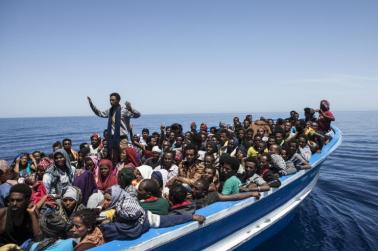 “Turkish Red Crescent has taken an initiative to support the Aquarius to continue sailing. The support tis needed to save more lives among those fleeing their countries and at risk of death while crossing the Mediterranean,” the statement added.
“Turkish Red Crescent has taken an initiative to support the Aquarius to continue sailing. The support tis needed to save more lives among those fleeing their countries and at risk of death while crossing the Mediterranean,” the statement added.
According to the statement Aquarius has been rescuing migrant lives in the Mediterranean Sea for the last three years.
It has saved 29,523 lives in the Mediterranean, a migration route for those seeking asylum in Europe.
__________________________________________
According to Wikipedia: [The Aquarius] was flagged under the flag of convenience of Gibraltar since February 2018. On 6 August 2018 the Gibraltar Maritime Administration issued a “notice of removal” for the Aquarius, because she was registered as a survey vessel, but used as a rescue ship. As a result, the ship was warned that she would be removed from Gibraltar registry.
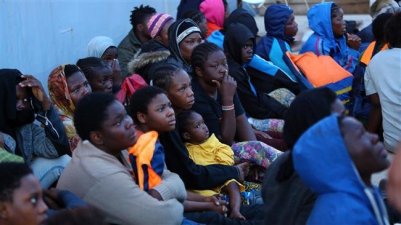 On 27 August 2018 the ship arrived in Marseille and its operator MSF announced, that the owner has applied for a registration of the vessel in another flag of convenience Panama on 20 August. However, on 22 September 2018 the maritime authority of Panama announced that it had initiated the procedures to remove the Aquarius (now renamed Aquarius 2) from its registry, quoting violations of international law in respect to migrants, rescue at sea and refusing to carry the migrants back to the area where they originated. The government of Panama had been informed by Italy and other sources that the Aquarius did not follow international legal proceedings concerning the transport of migrants, so it was decided to initiate the process to remove Aquarius 2 from Panama’s ship registry. Specifically, Aquarius has been accused of not returning the rescued migrants to Libya. As of that date the Aquarius was seeking a port to disembark the migrants, after having refused an earlier order from to transfer them from the Libyan coast guard.
On 27 August 2018 the ship arrived in Marseille and its operator MSF announced, that the owner has applied for a registration of the vessel in another flag of convenience Panama on 20 August. However, on 22 September 2018 the maritime authority of Panama announced that it had initiated the procedures to remove the Aquarius (now renamed Aquarius 2) from its registry, quoting violations of international law in respect to migrants, rescue at sea and refusing to carry the migrants back to the area where they originated. The government of Panama had been informed by Italy and other sources that the Aquarius did not follow international legal proceedings concerning the transport of migrants, so it was decided to initiate the process to remove Aquarius 2 from Panama’s ship registry. Specifically, Aquarius has been accused of not returning the rescued migrants to Libya. As of that date the Aquarius was seeking a port to disembark the migrants, after having refused an earlier order from to transfer them from the Libyan coast guard.
_______________________________________________
According to Al Jazeera: The EU has to recognise that its war adventures caused the refugee crisis and start working on a real solution.
Saudi journalist murdered, dismembered and “disappeared” in Turkey
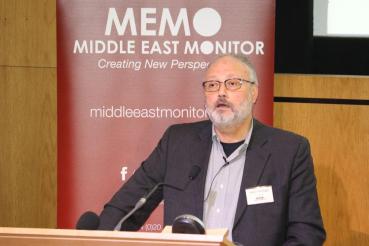 At this stage Saudi official sources are denying it – but it seems increasingly likely that veteran journalist Jamal Kasshoggi was lured into the Saudi Arabian consulate in Istanbul, murdered and smuggled in pieces out of the building.
At this stage Saudi official sources are denying it – but it seems increasingly likely that veteran journalist Jamal Kasshoggi was lured into the Saudi Arabian consulate in Istanbul, murdered and smuggled in pieces out of the building.
Kashoggi had been living in the United States and writing articles critical of the Saudi regime which were published in the Washington Post and elsewhere.
President Erdoğan says following case of missing Saudi journalist Khashoggi ‘personally’
Turkish President Tayyip Erdoğan said on Oct. 7 he was “personally” following the case of Saudi journalist Jamal Khashoggi, who disappeared last week, and added that he still hoped for a positive outcome to the matter.
“Whatever comes of this, we will be the ones to declare it to the world,” the president said, while answering reporters’ questions in the capital Ankara. “It is very, very upsetting for us that it happened in our country,” he said.
A presidential adviser said on Oct. 7 that Khashoggi had not left the Saudi consulate in Istanbul in “normal ways.” Turkish authorities have concrete information on Khashoggi’s disappearance and the case would not go unsolved, Yasin Aktay told broadcaster CNN Türk.
Meanwhile, the Washington Post reported on the night of Oct. 6 that Turkish investigators believe Khashoggi was killed in “a preplanned murder” at the kingdom’s consulate in Istanbul, citing two anonymous officials.
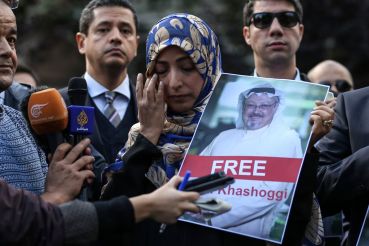
It’s probably too late for that!
One Turkish official also told The Associated Press that detectives’ “initial assessment” was that Khashoggi was killed at the consulate, without elaborating. Saudi authorities early Oct. 7 called the allegation “baseless.”
Khashoggi, who has lived in self-imposed exile in the U.S. for the last year, vanished on Oct. 2 while on a visit to the consulate.
The Post cited one anonymous official who said investigators believe a 15-member team “came from Saudi Arabia.” The official added: “It was a preplanned murder.”
Khashoggi, 59, went missing while on a visit to the consulate in Istanbul for paperwork to marry his Turkish fiancée. The consulate insists the writer left its premises, contradicting Turkish officials.
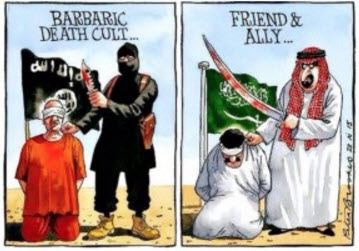 As a contributor to the Post, Khashoggi has written extensively about Saudi Arabia, including criticizing its war in Yemen, its recent diplomatic spat with Canada and its arrest of women’s rights activists after the lifting of a ban on women driving. All those issues have been viewed as being pushed by Prince Mohammed, who similarly has led roundups of activists, businessmen and others in the kingdom.
As a contributor to the Post, Khashoggi has written extensively about Saudi Arabia, including criticizing its war in Yemen, its recent diplomatic spat with Canada and its arrest of women’s rights activists after the lifting of a ban on women driving. All those issues have been viewed as being pushed by Prince Mohammed, who similarly has led roundups of activists, businessmen and others in the kingdom.
“With young Crown Prince Mohammed bin Salman’s rise to power, he promised an embrace of social and economic reform,” Khashoggi wrote in his first column for the Post. “But all I see now is the recent wave of arrests.”
Khashoggi maintained ties with Saudi elites, including those in its intelligence apparatus, and launched a satellite news channel, Al-Arab, from Bahrain in 2015 with the backing of Saudi billionaire Prince Alwaleed bin Talal.
The channel was on air for less than 11 hours before it was shut down. Its billionaire backer was detained in the Ritz Carlton roundup overseen by Prince Mohammed in 2017.
U.S. Senator Chris Murphy, the Connecticut Democrat who sits on the Senate’s Committee on Foreign Affairs, expressed shock over the news.
“If this is true—that the Saudis lured a U.S. resident into their consulate and murdered him—it should represent a fundamental break in our relationship with Saudi Arabia,” Murphy wrote on Twitter.